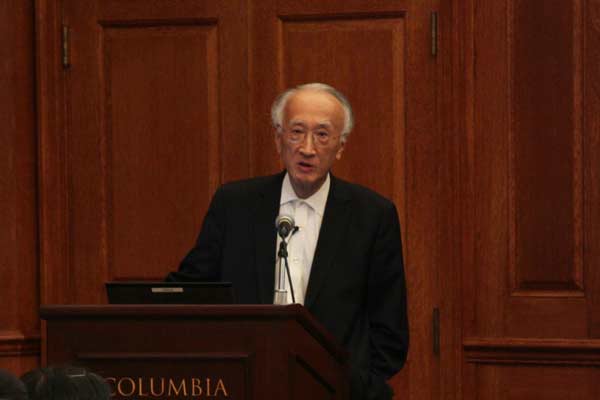China will overtake the West on energy consumption: Expert
Updated: 2014-11-08 06:46
By AMY HE in New York(China Daily USA)
|
||||||||
 |
|
Nobuo Tanaka, former executive director of the International Energy Agency, discussing China's energy use and the future of energy sustainability in Asia at Columbia University in New York on Nov 6, 2014. AMY HE / CHINA DAILY |
China's energy demand is a "game changer" and energy consumption in the world's most populous country and throughout Asia will overtake that of Western economies by 2035, said a former executive director of the International Energy Agency.
With long-term energy consumption trends, "the game changer is always China, not OECD (Organization for Economic Cooperation and Development) countries," Nobuo Tanaka said on Thursday at Columbia University in New York. "OECD countries combine to about 40 percent of the gross share of energy demand, while China, India, and Asian countries" total about 60 percent, he said.
Crises in Iraq and Ukraine this year will have strong implications for Asian countries, Tanaka said, and in particular for China. The sanctions imposed on Russia by the US means that a partnership between China and Russia was accelerated, with the two countries negotiating a $400 million, 30-year energy deal this June. The agreement was for the creation of a pipeline that will deliver 4 trillion cubic meters of gas to China over the next three decades.
"Russia is moving toward the East, especially China," Tanaka said. "This opportunity will be good for not only China, but for Asian countries, because the pipeline will come closer to the Pacific and it will benefit Japan too."
In addition, US conflict in the Middle East and the country's lessening reliance on oil imports will mean that the major recipients of Middle Eastern oil exports will be Asian countries, Tanaka said. By 2035, almost 90 percent of Middle Eastern oil exports will go to Asia, according to his estimates.
China now imports more oil from the Middle East than any other region in the world, and Middle Eastern oil accounts for the majority of China's oil imports, according to the US Energy Information Administration (EIA). The agency projects that China will surpass the US this year to become the largest net oil importer.
Tanaka also said China will succeed in developing its shale deposits to replace coal.
"It may take some time, but it is happening," he said.
The EIA estimated that China's shale reserves are the largest in the world and said that China's national oil companies have been focusing on shale gas acquisitions in the last few years.
"The winner of the shale revolution is China, India, developing countries, emerging economies, and the United States," Tanaka said.
Tanaka spoke at the inaugural China energy discussion hosted by the Columbia Earth Institute's China Sustainability Project on environment, energy, and politico-economic ecosystems. The institute recently launched its China Sustainability Project to study green development in China, particularly on energy use. Its goals are to educate, research, and advice on policy, according to program director André Corrêa d'Almeida.
The program was developed because there is strong academic interest from students who want to engage in more debate on Chinese development, he said, and much political discourse happening within the Chinese government on the national and local level on pollution and sustainability as well.
- US report cites China's energy consumption
- China's energy consumption rises 3.9 pct in 2012
- China to cut unit industrial energy consumption by 5%
- China nods energy consumption control target
- Nation to maintain cap on energy consumption
- China sets slower energy consumption targets
- Urbanization with low energy consumption
- China to cut energy consumption
- China says energy consumption is controllable
- China’s energy consumption double world average
Most Viewed
Editor's Picks

|

|

|

|

|

|
Today's Top News
Sultan of Brunei acquires NYC's Plaza Hotel
Beijing backs global multilateral trading system
China to overtake the West on energy consumption
Apple hits back at malware in China
Mexico cancels bullet train deal
China, Japan reach four-point agreement on ties
China's wealthy look to make 'social impact' on education
Airline exec sees bright side for China and US
US Weekly

|

|
















